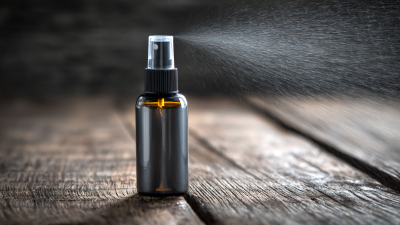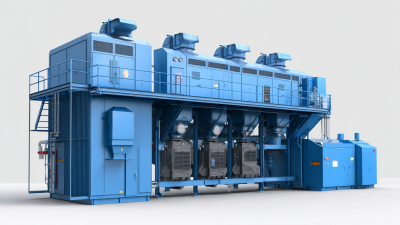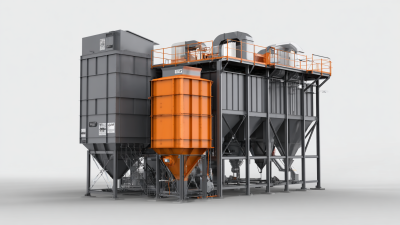Everything You Need to Know About Choosing the Right Filter Bag for Your Dust Collector
Table of Contents
- Understanding the Importance of Filter Bags in Dust Collection Systems
- Key Factors to Consider When Choosing Filter Bags for Your Needs
- Types of Filter Bags: What You Should Know About Fabrics and Materials
- Assessing Airflow Resistance and Filter Efficiency for Optimal Performance
- Maintenance Tips to Extend the Life of Your Dust Collector Filter Bags
- Cost vs. Quality: Making an Informed Investment in Filter Bags
- Optimizing Air Quality: The Essential Role of Cartridge Filters in Dust Collector Systems
- FAQS
- Conclusion
- Related Posts
When it comes to the industrial world, you really can't underestimate how important good dust collection systems are—especially in places where keeping the air clean is a big deal. The U.S. EPA actually reports that nearly 15 million tons of particulate matter get dumped into the air every year, so systems like dust collectors play a huge role in fighting pollution. Now, a crucial part of these systems is the Filter Bag for Dust Collector. It might not sound sexy, but choosing the right one can make a big difference in how well dust gets trapped, how much you spend on operation costs, and how long your equipment lasts. At Shanghai Jiongcheng Industrial, we’re all about cutting-edge tech and thorough lubrication solutions.

We totally get how controlling dust isn’t just about meeting regulations—it’s also about keeping your machinery running smoothly. Our expertise with high-temperature chain lubricants and compressor lubricants really backs up the idea that keeping everything in tip-top shape is key. So, picking the right filter bag isn’t just a small detail; it’s a smart move to boost dust collection and cut down on maintenance hassles down the line.
Understanding the Importance of Filter Bags in Dust Collection Systems
Filter bags are pretty much the frontline heroes in dust collection systems. They’re what keep airborne dirt and debris at bay in all sorts of industrial setups. Choosing the right filter bag isn’t just a small detail — it’s a pretty big deal because it affects how well the whole dust collection system works. If you go for the wrong type or don’t pick carefully, dust can start to build up, which might cause things to run slower, and you could end up paying more in maintenance. So, it’s super important to get familiar with the specs and materials of these filter bags to keep dust under control effectively.
Now, as the global market for industrial dust collectors keeps expanding—expect it to jump from around $8.3 billion in 2025 up to nearly $12 billion by 2032—companies really need to stay on top of their dust control game. Sadly, many organizations overlook regular maintenance because of a lack of skilled workers or old knowledge they’ve lost over time. But here’s the thing — investing in good quality filter bags and taking proper care of them can really boost your dust management efforts, keep your workers safe, and help you stay compliant with regulations, no problem.

Key Factors to Consider When Choosing Filter Bags for Your Needs
When you're picking out the right filter bag for your dust collector, there are a few key things to keep in mind to make sure everything works smoothly and efficiently. First off, take a look at the filter media material—options like polyester, polypropylene, and nomex each have their own pros and cons when it comes to filtration and handling high temperatures. Many reports suggest that using specialized materials can actually boost the filter’s lifespan by up to 30%, which means lower running costs in the long run (Source: Filtration Industry Analysts, 2023).
Another thing to consider is the size and shape of the filter bag. This can really impact how well air flows through and how effectively dust gets captured. A good, well-designed filter bag will help reduce pressure drops while still catching as much dust as possible—super important in high-efficiency setups. According to a study by the Industrial Air Filtration Association, getting the sizing right can improve the overall efficiency of a dust collector by up to 20%. Plus, you wanna make sure the filter is compatible with the type of dust you're dealing with—whether it’s tiny particles or heavier dust loads—so it does its job properly.
At Shanghai Jiongcheng Industrial Co., Ltd., we get it—every industry has its own unique needs. While we’re experts in providing comprehensive lubrication solutions, we also know a thing or two about integrating dust control systems in industrial settings. By carefully choosing the right filter bags, companies can keep their dust collection—and even their lubricant systems—running at peak performance. That all adds up to smoother operations and better efficiency overall.
Filter Bag Selection Criteria for Dust Collectors
This chart illustrates the key factors to consider when selecting the right filter bag for your dust collector. Each factor is rated on a scale of 1 to 5 based on its importance in ensuring optimal dust collection performance.
Types of Filter Bags: What You Should Know About Fabrics and Materials
When you're choosing filter bags for your dust collector, it’s pretty important to get a handle on the different types of fabrics and materials out there. There’s quite a range, each one suited for specific jobs. Usually, you’ll come across materials like polyester, polypropylene, and fiberglass. Polyester is a popular pick because it’s pretty tough and resists wear and tear, so it works well for general dust collection. Polypropylene is often used when chemical resistance is a must—perfect if your dust is mixed with chemicals. Then there’s fiberglass, which is great for high-temp situations thanks to its heat-resistant properties.
A good tip? Think about the kind of dust or particles you’re dealing with. Picking the right fabric isn’t just about efficiency; it also helps your filter bag last longer.
And don’t forget, how the bag is built matters a lot too. Some bags have special coatings that help dust come off easier and prevent clogging. You might also see pleated bags—these give you a bigger surface area, which can mean less pressure drop and better dust capturing.
Another thing to keep in mind: make sure to evaluate the working conditions of your system—things like temperature and humidity will definitely influence your choice of materials and how the bag should be constructed.
Assessing Airflow Resistance and Filter Efficiency for Optimal Performance
When you're picking out the right filter bag for your dust collector, it's pretty important to consider both how much resistance to airflow it offers and how efficient the filter actually is. From what industry reports are saying, a good filter bag can really boost dust collection performance and even save energy at the same time. For example, filter bags that don’t put up much resistance let more air flow through easily, which means less strain on your dust collector—and that can help it last longer. Plus, research shows that with the right materials, like advanced synthetic fabrics, filter efficiency can hit over 99%. These fabrics are great because they catch even the tiniest particles but still keep the airflow steady.
Here at Shanghai Jiongcheng Industrial Co., Ltd., we get how crucial a good dust collection system is—especially because it can directly affect how well lubricants work during industrial processes. We’re committed to offering comprehensive lubrication solutions that go hand-in-hand with efficient dust management. For instance, high-temperature chain lubricants need a clean environment to stay in top shape. So, investing in high-quality filter bags isn’t just about dust control; it’s also about protecting the performance of the lubricants we develop—using cutting-edge technology and thorough quality checks. At the end of the day, picking the right filter bag is a key step towards better air filtration and making your lubrication systems work more smoothly.
Maintenance Tips to Extend the Life of Your Dust Collector Filter Bags
Taking good care of your filter bags is super important if you want your dust collector to work efficiently. Honestly, regular checks and a quick clean can really help them last way longer. Keep an eye out for any signs of wear and tear or if things seem clogged up. If you notice airflow slowing down, that’s your cue to clean or swap out those bags before it damages the whole system.
It’s a good idea to set up a routine maintenance plan. Trust me, doing this means you’ll catch issues early on and keep your dust collector running smoothly. When cleaning, use a soft brush or some compressed air to loosen up the dust — it’s a simple step but makes a big difference. Also, make sure you're using the right type of filters for your specific needs because that really impacts how long they last and how well they perform.
And don’t forget to consider the environment where your dust collector lives. If it’s super humid or really hot or cold, those conditions can wear out your filter bags faster. By keeping an eye on that, along with regular maintenance, you'll keep things running efficiently and save yourself some time and money in the long run. Believe me, a little TLC goes a long way!
Cost vs. Quality: Making an Informed Investment in Filter Bags
When you're choosing the right filter bag for your dust collector, it's all about finding that sweet spot between cost and quality. Sure, it can be tempting to go for the cheaper options just to save some bucks upfront, but trust me, you’ve gotta think long-term. Cheaper, lower-quality bags might seem like a deal, but they often mean more hassle — more maintenance, more frequent replacements, and your system just won’t run as efficiently. In the end, that can end up costing you more money, not less, and frankly, it’s a total pain.
On the flip side, investing in good-quality filter bags might cost a bit more initially, but they really make a difference. They boost your dust collector's performance, catch more particles, and last way longer. These premium bags are built to handle all sorts of conditions without losing their efficiency over time, meaning fewer replacements and less downtime. Plus, many of them come with warranties, giving you a little peace of mind. So, when you’re making your choice, it’s smart to think about the total cost over the lifetime of the bags, not just the upfront price tag. Better to spend a little more now for better performance and savings down the road, right?

Optimizing Air Quality: The Essential Role of Cartridge Filters in Dust Collector Systems
In today's industrial environment, optimizing air quality has become paramount, and cartridge filters play a crucial role in dust collector systems. Their unique concave fold pattern design ensures a 100% effective filtration area, allowing for maximum operating efficiency. This effective design not only enhances the overall performance of the filtration system but also ensures that dust and particulate matter are captured efficiently, contributing to a cleaner and healthier workspace.
Durability is another standout feature of these specialized filter cartridges, which are crafted using advanced foreign technology. The adhesive bonding utilized in the manufacturing process strengthens the integrity of the filters, providing longevity and reliability under demanding conditions. The optimal fold spacing within the cartridges promotes uniform filtration, reducing pressure differences across the filter elements. This stability in airflow is essential, particularly in environments like spray rooms where consistent air quality is crucial for operational effectiveness. Additionally, the intelligent design of the curved folding top increases the effective filtration area, further maximizing filtration efficiency while also prolonging the service life of the cartridges. The rich elasticity and low hardness of the sealing ring ensure a robust and effective seal, making these cartridge filters a vital component in achieving optimal air quality.
FAQS
: Filter bags are essential for dust collection systems as they act as the first line of defense against airborne contaminants, ensuring optimal performance and efficiency in the filtration process.
Proper selection of filter bags is crucial because inadequate filtration can lead to dust buildup, resulting in operational inefficiencies and increased maintenance costs.
Common materials include polyester, polypropylene, and fiberglass. Each material is suited for specific applications based on factors like durability, chemical resistance, and heat resistance.
The right fabric improves efficiency and prolongs the life of the filter bag, which is influenced by the specific type of dust or particles being collected.
Features such as specialized coatings for dust release, minimized clogging, and pleated designs that increase surface area can enhance filter bag performance.
Factors such as temperature and humidity in the dust collection system should be considered, as they can significantly influence the choice of materials and construction designs.
The market is projected to increase from $8.27 billion in 2025 to $11.96 billion by 2032, highlighting the growing emphasis on proper filtration management.
Investing in quality filter bags can improve dust management strategies, enhance worker safety, and help businesses meet regulatory standards effectively.
Regular maintenance is essential to ensure the effectiveness of dust control systems, as a lack of skilled workers and knowledge retention has led many organizations to overlook this critical aspect.
Conclusion
Picking the right filter bag for your dust collector isn’t just a small detail — it’s pretty much the secret to keeping everything running smoothly and efficiently. If you really want to get it right, you’ve got to understand why filter bags matter so much. They’re key players in improving air quality and making your equipment last longer. When choosing one, it’s a good idea to look at what materials they’re made of because that directly impacts how well air flows through and how effective they are at filtering stuff out. Taking the time to check out these details can make a big difference in finding the perfect fit for your system.
And hey, don’t forget — regular maintenance is a total game-changer. It helps your filter bags last longer and keeps your dust collector performing like a champ day after day. When you’re shopping around for filter bags, try to find that sweet spot between cost and quality. Spending a little extra on good quality filters can really pay off in the long run, keeping your whole setup running smoothly. Over here at Shanghai Jiongcheng Industrial Co., Ltd., we’re all about delivering top-notch lubrication solutions. But we also get how important it is to use the right filters to keep your industrial operations efficient and hassle-free.
Related Posts
-

Maximize Efficiency with the Right Filter Bag For Dust Collector in Industrial Settings
-

5 Hidden Benefits of Using Synthetic Lubricant Spray You Never Knew About
-

Maximizing Efficiency: How Industrial Dust Collectors Reduce Airborne Particles by 95% in Manufacturing Facilities
-

Top Strategies for Selecting the Best Reliant Dust Collector A Guide for Global Buyers
-

Discover Outstanding Products from China with the Best Reliant Dust Collector 720 for Global Buyers
-

Comprehensive Guide to Understanding the Working Principle of Cyclone Dust Collectors for Global Buyers
Blog Tags:

